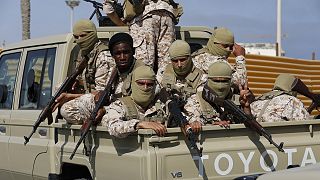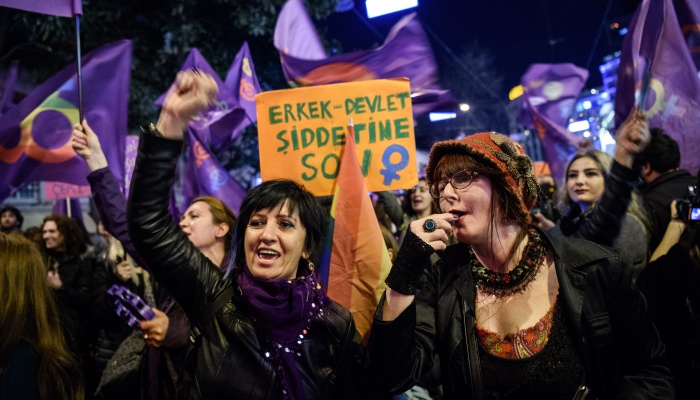By Euronews with AP • Updated: 28/05/2022 - 14:50

Forces loyal to Abdul Hamid Dbeibah, one of Libya’s two rival prime ministers, secure the streets of Tripoli on 17 May 2022 -
Libya faces a serious security threat from foreign fighters and private military companies, especially Russia's Wagner Group which has violated international law, a UN expert report said.
The experts also accused seven Libyan armed groups of systematically using unlawful detention to punish perceived opponents, ignoring international and domestic civil rights laws, including those prohibiting torture.
In particular, "migrants have been extremely vulnerable to human rights abuses and regularly subjected to acts of slavery, rape and torture," the panel said in the report to the UN Security Council obtained late Friday.
The oil-rich North African nation plunged into turmoil after a NATO-backed uprising in 2011 toppled dictator Muammar Gaddafi, who was later killed.
It then became divided between rival governments: one in the east, backed by military commander Khalifa Hifter, and an UN-supported administration in the capital of Tripoli. Each side is propped up by different militias and foreign powers.
In April 2019, Hifter and his forces, backed by Egypt and the United Arab Emirates, launched an offensive to try and capture Tripoli.
His campaign collapsed after Turkey stepped up its military support for the UN-supported government with hundreds of troops and thousands of Syrian mercenaries.
An October 2020 cease-fire deal led to an agreement on a transitional government in early February 2021 and elections were scheduled for the last 24 December aimed at unifying the country.
But they were cancelled and the country now has rival governments with two Libyans claiming to be prime ministers.
Hope for progress in Libya as factions agree interim presidential council
The cease-fire agreement called for the speedy withdrawal of all foreign fighters and mercenaries but the panel said "there has been little verifiable evidence of any large-scale withdrawals taking place to date."
The report said Chadian opposition groups operate from Libya and Sudanese fighters have been recruited by Hifter.
Wagner mercenaries accused of crimes against civilians
Turkish-backed Syrian combatants have been seen by the panel in government military camps in Tripoli, while Hifter-affiliated Syrian fighters operate alongside the Wagner Group's mercenaries in the strategic northern city of Sirte and nearby Jufra.
At least 300 of these Syrians have returned home and not been replaced by Hifter, the report said.
The panel said it continues to investigate the deployment of Wagner fighters and the transfers of arms and related materiel to support its operations.
The Wagner Group passes itself off as a private military contractor and the Kremlin denies any connection to it.
But the US identifies Yevgeny Prigozhin, an oligarch who is close to Russian President Vladimir Putin as Wagner's main financier and the group has been hired in a number of conflicts to serve the interests of the Russian government.
EU sanctions Russia's Wagner Group over human rights abuse claims
The panel said it considers a Samsung electronic tablet left on a Libyan battlefield by a Wagner mercenary and obtained by the BBC in early 2021 to be authentic.
It contained maps of the locations of 35 unmarked anti-personnel mines in the Ain Zara area of south Tripoli which was then a frontline area under Hifter's control, supported by Wagner.
Several mines had never been reported as being in Libya before and their transfer, therefore, violated the UN arms embargo, the panel said. It added that a booby-trapped mine exploded during a clearance operation killing two civilian experts.
The report claims that the authors also received information about the recovery of anti-tank mines from positions primarily occupied by Wagner in south Tripoli.
The panel said the failure to visibly mark the anti-personnel and anti-tank mines and issue warnings of their locations to civilians in the areas was a violation of the international humanitarian law by Wagner.
Russia, China blocking report into Libya conflict arms embargo violations
The Wagner tablet also contained a list of requested items including drones and tanks that would violate the arms embargo if delivered, the panel said, but it did not know if any of it had.
The panel said it identified 18 arms transfers and four examples of military training between March 2021 and late April 2022 that violated the UN arms embargo.
Among the examples it cited was the Luccello, a ship flying the Comoros flag that delivered 100 armoured vehicles to Hifter in Benghazi.
'Turning a blind eye to rape'
The experts said four migrants suffered human rights abuses in secret detention facilities controlled by human traffickers in the areas of Tazirbu in the Libyan desert and Bani Walid near the northwest coast.
They said victims were enslaved, severely beaten, deliberately starved and denied medical care.
"Two former female detainees, who were 14- and 15-year-old girls at the time, further testified to the panel that multiple perpetrators repeatedly raped them, subjected them to sexual slavery and other forms of sexual violence during the period of over 18 months in a secret detention facility in Bani Walid," the report said.
Libya's detention centre closures: lancing lawlessness or consolidating poltical control?
The panel said it also found that guards responsible for protecting the most vulnerable migrants in the government-run Shara al-Zawiya detention centre "took a direct part in or turned a blind eye to consistent acts of rape, sexual exploitation and threats of rape against women and girls" detained there between January and June 2021.










